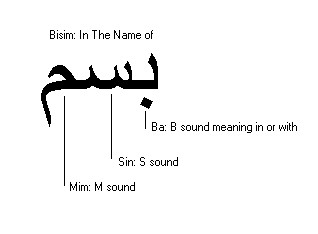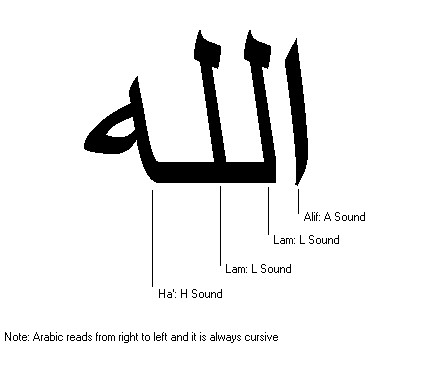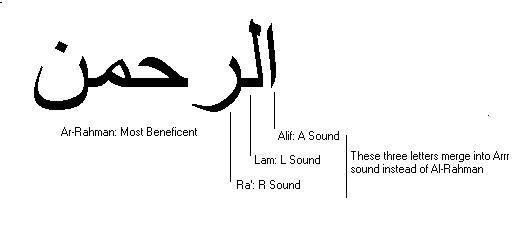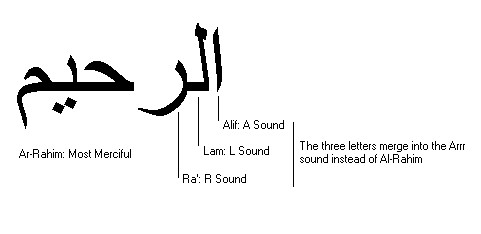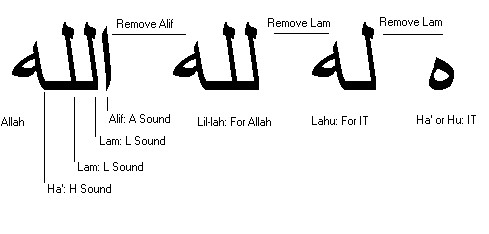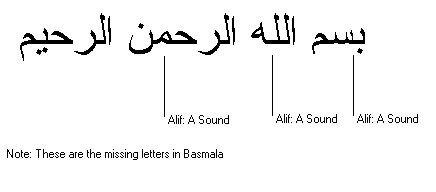تفسير القرآن/ التستري
قال أبو بكر: سئل سهل عن معنى: { بسم
الله الرَّحْمٰنِ الرَّحِيـمِ } فقال:
الباء بَهاء الله عزَّ وجلَّ: والسين
سناء الله عزَّ وجلَّ. والميم مجد
الله عزَّوجلَّ.
والله: هو الاسم الأعظم الذي حوى
الأسماء كلها، وبين الألف واللام منه حرف
مكنى غيب من غيب إلى غيب، وسر من سر إلى سر، وحقيقة من حقيقة إلى حقيقة.
لا ينال فهمه إلاَّ الطاهر من الأدناس، الآخذ من الحلال قواماً ضرورة
الإيمان.
والرحمن: اسم فيه خاصية من الحرف المكنى
بين الألف واللام.
والرحيم: هو العاطف على عباده بالرزق في
الفرع والابتداء في الأصل رحمة
لسابق علمه القديم.
قال أبو بكر: أي بنسيم روح الله اخترع
من ملكه ما شاء رحمة لأنه رحيم.
وقال علي بن أبي طالب رضي الله عنه: " الرحمن الرحيم " اسمان رقيقان
أحدهما أرقُّ من الآخر، فنفى الله تعالى بهما القنوط عن المؤمنين من عباده.
تفسير لطائف الإشارات / القشيري
{ بسم الله الرَّحْمٰنِ الرَّحِيـمِ }
الباء في بسم الله حرف التضمين؛ أي
بالله ظهرت الحادثات، وبه وجدت
المخلوقات، فما من حادث مخلوق، وحاصل منسوق، من عين وأثر وغبر، وغيرٍ من
حجر ومدر، ونجم وشجر، ورسم وطلل، وحكم وعلل - إلا بالحق وجوده، والحق
مَلِكُه، ومن الحق بدؤه، وإلى الحق عوده، فبه وَجَدَ من وَحَّد، وبه جحد
من الحد، وبه عرف من اعترف، وبه تخلَّف من اقترف.
وقال: { بسم الله } ولم يقل بالله على
وجه التبرك بذكر اسمه عند قوم،
وللفَرْقِ بين هذا وبين القَسَم عند الآخرين، ولأن الاسم هو المسمى عند
العلماء، ولاستصفاء القلوب من العلائق ولاستخلاص الأسرار عن العوائق عند
أهل العرفان، ليكون ورود قوله { الله } على قلبٍ مُنقَّىً وسرٍ مُصَفَّىً.
وقوم عند ذكر هذه الآية يتذكرون من الباء (بره) بأوليائه ومن السين سره مع
أصفيائه ومن الميم منته على أهل ولايته، فيعلمون أنهم ببره عرفوا سرّه،
وبمنته عليهم حفظوا أمره، وبه سبحانه وتعالى عرفوا قدره. وقوم عند سماع
بسم الله تذكروا بالباء براءة الله سبحانه وتعالى من كل سوء، وبالسين
سلامته سبحانه عن كل عيب، وبالميم مجده سبحانه بعز وصفه، وآخرون يذكرون
عند الباء بهاءه، وعند السين سناءه، وعند الميم ملكه، فلما أعاد الله
سبحانه وتعالى هذه الآية أعني بسم الله الرحمن الرحيم في كل سورة وثبت
أنها منها أردنا أن نذكر في كل سورة من إشارات هذه الآية كلمات غير مكررة،
وإشارات غير معادة، فلذلك نستقصي القول ها هنا وبه الثقة.
تفسير عرائس البيان في حقائق القرآن/
البقلي
{ بِسمِ } الباء كشف البقاء لأهل
الفَنَاء والسين كشف سناء القدس لأهل
الأنس والميم كشف الملكوت لأهل النعوت والباء بره للعموم والسين سره
للخصوصُ والميم محبّته لخصوص الخصوص والياء بدو العبودية والسين سِرّ
الربوبية والميم منة في أزليته على أهل الصفوة والباء من بِسمِ أي ببهاء
بقاء ارواح العارفين في بحار العظمة والسين من بسم اي بسنائى سمت أسرار
السابقين في هواء الهوية والميم من بسم اى بمجدى وردت المواجيد الى قلوب
الواجدين من انوار المشاهدة وروى عن النبى صلى الله عليه وسلم ان الباء
بهاؤه والسين سناؤه والميم مجده وقيل في بسم الله بالله ظهرت الاشياء وبه
فتيت وبتحليله حسنت المحاسن وباستناره فتحت المفاتيح وحكى عن الجنيد انه
قال ان اهل المعرفة تقوا عن قلوبهم كل شيء سوى الله فقال لهم قولوا بسم
الله اى بى فتسمّوا ودعوا انسابكم الى اده وقيل ان بسم يبقى به كل الخلق
فلو افتتح كتابه باسمه لذاب تحته حقيقة الخلائق الا من كان محفوظاً من
نبىّ او ولىِّ وروى علىّ بن موسى الرضا عن ابيه عن جعفر بن محمد قال بسم
الباء بقاؤه والسين سماؤه والميم ملكه فايمان المومن ذكره ببقائه وخدمةُ
المريد ذكره باسمائه والعارف فناؤه عن المملكة بالمالك لها واما الله فانه
اسم الجمع لا ينكشف الا لاهل الجمع وكل اسم يتعلق بصفة من صفاته الا الله
فانه يتعلق بذاته وجميع صفاته لاجل ذلك وهو اسم الجمع اخبر الحق عن نفسه
باسمه الله فيما يعرفه الا هو ولا يسمعه الا هو ولا يتكلّم به الا هو لان
الالف اشارة الى الانانيّة والوحدانية ولا سبيل للخلق الى معرفتها الا
بالحق تعالىوفي اسمه الله لا مان الاول اشارة الى الجمال والثاني اشارة
الى الجلال والصفتان لا يعرفها الا صاحب الصفات والهاء اشارة الى هويته
وهويته لا يعرفها الا هو والخلق معزولون عن حقائقه فيحتجبون بحروفه عن
مَعْرفَته بالالف تجلى الحقُّ من انانيته لقلوب الموحدين فتوحدوا به
وباللام الاول تجلى الحق من ازليته لارواح العارفين فانفرد بانفراده
وباللام الثاني تجلى الحق من جمال مشاهدته لاسرار المحبّين فغابوا في بحار
حبّه وبالهاء تجلى الحق من هويته لفواد المقربين فَتَاهُوا في بيداء
التحير من سَطَوات عظمته قال الشبلى ما قال الله احد سوى الله فان كان من
قاله بحظ وانّى يدرك الحقائق بالمحظوظ وقال الشبلىّ الله فقيل له لِمَ لا
تقول لا اله الا الله فقال لا ابقى به ضدّا وقيل في قوله الله هو المانع
الذى يمنع الوصول اليه كما امتنع هذا الاسم عن الوصول اليه حقيقة كان
الذات اشد امتناعاً عجزهم في اظهار اسمه لهم ليعلموا بذلك عجزهم عن درك
ذاته وقيل فى قوله ان الالف اشارة الى الوحدانية واللام الاولى اشارة الى
محو الاشارات واللام الثانية اشارة الى محو المجوف كشف الهاء وقيل الاشارة
فى الالف هو بقاء الحق بنفسه وانفصاله عن جميع خلقه فلا اتصال له بشئ من
خلقه كامتناع الالف ان يتصل بشئ من الحروف ابتداءً بل يتصل الحروف به على
حد الاحتياج اليه وابتغائه عنهم وقيل ليس من اسماء الله اسم يبقى تلى
اسقاط كل حرف منه الا الله فانه الله فاذا اسقطت منه الالف يكون لله فاذا
اسقطت احد لامَيه يكون له فاذا اسقطت اللامين بقى الهاء وهو غايةُ الاشارة
وقال بعضهم الباء باب خزانة الله والسين سين الرسالة والميم ملك الولاية
وقال بعضهم بالله سلم قلوب اولياء الله من عذاب الله وبنقطته تطرفت اسرار
اصفياء الله الى حضرته وبرحمته تفرَّدت افئدة خواص عباده معه وقال بعضهم
بالله تحيّرت قلوب العارفين فى علم ذات الله وبشفقته توصلت علوم العالمين
الى صفات الله وبرحمته ادركت عقول المؤمنين شواهد ما اشهدهُم الله من بيان
الله وقيل بالهيته تفرَّدت قلوب عباد الله وبتعطُّفه صفت ارواحُ محبيه
وبرحمته ذكرت نفوس عابديه وقيل بسم الله ترياق اعطى المومنين يدفع الله به
عنهم سم الدنيا وضَررها وقالَ جعفر الصادق بسم للعامة ولله الخاص الخاص
وقال سهل الله هو اسم الله الاعظم الذي حق الاسماء والاسامى كلها وبين
الالف واللام منه حرف مكنّى غيب من غيب الى غيبه وسرُّ من سرِّ الى سِرّ
حقيقةٌ من حقيقةٍ الى حقيقته الا ينال فهمه الا الطاهر من الادناس الاخذ
من الحلال قواماً ضرورة الايمان وقيل من قال بالحروف فانه لم يقل الله
لانه خارج عن الحروف والحسوس والاوهَام والافهام ولكن رضى منا بذلك لانه
لا سبيل الا توحيده من حيث لا حال ولا قال وحكى ان ابا الحسَنِ النوريُّ
بقى في منزله سبعة ايام لم ياكل ولم يشرب ولم ينم ويقول فى ولهة ودهشة
الله الله وهو قائمٌ يَدُور فاخبر الجنيد قال انظروا محفوظ عليه اوقاته
فقيل انه يصلي الفرائض فقال الحمد لله الذى لم يجعل للشيطان له سبيلاً ثم
قال قوموا حتى نزوره اما ان نستفيد منه او نقيده فدخل عليه وهو في ولهه
وقال يا ابا الحسن ما الذى ولهك قال اقوال لله الله زيدُ اعلى فقال له
الجنيد انظر هل قولك الله الله ام قولك ان كان كنت القائل لله الله فلست
القائل له وان كنت تقول بنفسك فانت مع نفسك فما معنى الوله قال نعم المودب
كنت وسكن من ولهه امّا قوله { الرحمن } رحم على اوليائه بسم الرحمن بتعريف
نفسه لهم حتّى عرفوا به اسمائه وصفاته وجلاله وجماله وبه خرجت جميع
الكرامات للابدال والصديقين وبه تهيّات اسرار المقامات للاسفياء والمقربين
وبه تجلت انوار المعارف للاتقياء والعارفين لان اسم الرحمن مخبرٌ عن خلق
الخلق وكرمه على جميع الخلق وفى اسمه الرحمن ترويحُ ارواح الموحدين ومزيد
افراح العارفين وتربية اشباح العالمين وفيه نزهة المحبّين وبَهْجة
الشائقين وفرحة العاشقين وامان المذنبين ورجاء الخائفين وقال بعضهم اسمه
الرحمن حلاوة المنّة ومشاهدة القرية ومحافظة الحرمة وقال ابن عطافى اسمه
الرحمن عونه نصرته وقوله { الرحيم } موهبة الخاص لاهل الخاص هو مستند لذوي
العثرات ومسرّة لاهل القربات والرّحمن مطيّة السالكين تسير بهم الى معدن
العناية والرحيم حبل الحق المجذوبين تجذبهم به الى جَمال الوصلة باسم
الرحمن اَمَنهم من العقاب وباسمه الرّحين اَتَاهُم من نفايس الثواب الاول
مفتاح المكاشفة والاخر مرقاة المشاهدة باسمه الرحمن فتح لهم الغيوب وباسمه
الرحيم غفر لهم الذنوب وقال ابن عطافى اسمه الرحيم مودّة ومحبّة وعن جعفر
بن محمد فى قوله الرحمن الرحيم انه قال هو واقع على المريدين والمرادين
فاسم الرحمن للمرادين لاستغراقهم فى انوار الحقائق والرحيم للمريدين
لبقائهم مع انفسهم واشتغالهم بالظاهر.
تفسير ابن عربي
{ بسم الله الرَّحْمٰنِ الرَّحِيـمِ }
اسم الشيء ما يعرف به، فأسماه الله
تعالى هي الصور النوعية التي تدلّ
بخصائصها وهوياتها على صفات الله وذاته، وبوجودها على وجهه، وبتعينها على
وحدته، إذ هي ظواهره التي بها يعرف. و {الله } اسم للذات الإلهية من حيث
هي هي على الإطلاق، لا باعتبار اتصافها بالصفات، ولا باعتبار لا اتصافها.
و {الرحمن } هو المفيض للوجود والكمال
على الكل بحسب ما تقتضي الحكمة
وتحتمل القوابل على وجه البداية. و {الرحيم } هو المفيض للكمال المعنويّ
المخصوص بالنوع الإنساني بحسب النهاية، ولهذا قيل: يا رحمن الدنيا
والآخرة، ورحيم الآخرة. فمعناه بالصورة الإنسانية الكاملة الجامعة الرحمة
العامّة والخاصة، التي هي مظهر الذات الإلهي والحق الأعظمي مع جميع الصفات
ابدأ واقرأ، وهي الاسم الأعظم وإلى هذا المعنى أشار النبي صلى الله عليه
وسلم بقوله: " أوتيت جوامع الكلم، وبعثت لأتمم مكارم الأخلاق " ، إذ
الكلمات حقائق الموجودات وأعيانها. كما سمي عيسى عليه السلام كلمة من
الله، ومكارم الأخلاق كمالاتها وخواصها التي هي مصادر أفعالها جميعها
محصورة في الكون الجامع الإنساني. وههنا لطيفة وهي أن الأنبياء عليهم
السلام وضعوا حروف التهجي بإزاء مراتب الموجودات. وقد وجدت في كلام عيسى
عليه الصلاة والسلام وأمير المؤمنين علي عليه السلام وبعض الصحابة ما يشير
إلى ذلك. ولهذا قيل: ظهرت الموجودات من باء بسم الله إذ هي الحرف الذي يلي
الألف الموضوعة بإزاء ذات الله. فهي إشارة إلى العقل الأول الذي هو أول ما
خلق الله المخاطب بقوله تعالى: " ما خلقت خلقاً أحب إليّ ولا أكرم عليّ
منك، بك أعطي، وبك آخذ، وبك أثيب، وبك أعاقب... " الحديث.
والحروف الملفوظة لهذه الكلمة ثمانية
عشر، والمكتوبة تسعة عشر. وإذا
انفصلت الكلمات انفصلت الحروف إلى اثنين وعشرين، فالثمانية عشر إشارة إلى
العوالم المعبر عنها بثمانية عشر ألف عالم، إذ الألف هو العدد التام
المشتمل على باقي مراتب الأعداد فهو أمّ المراتب الذي لا عدد فوقه، فعبر
بها عن أمّهات العوالم التي هي عالم الجبروت، وعالم الملكوت، والعرش،
والكرسي، والسموات السبع، والعناصر الأربعة، والمواليد الثلاثة التي ينفصل
كل واحد منها إلى جزئياته.
والتسعة عشر إشارة إليها مع العالم
الإنساني، فإنه وإن كان داخلاً في عالم
الحيوان إلا أنه باعتبار شرفه وجامعيته للكل وحصره للوجود عالم آخر له شأن
وجنس برأسه له برهان، كجبريل من بين الملائكة في قوله تعالى:
{ وَمَلاۤئِكَتِهِ وَرُسُلِهِ }
[البقرة، الآية: 98].
والألفات الثلاثة المحتجبة التي هي تتمة
الاثنين والعشرين عند الانفصال
إشارة إلى العالم الإلهيّ الحقّ، باعتبار الذات، والصفات، والأفعال. فهي
ثلاثة عوالم عند التفصيل، وعالم واحد عند التحقيق، والثلاثة المكتوبة
إشارة إلى ظهور تلك العوالم على المظهر الأعظميّ الإنسانيّ ولاحتجاب
العالم الإلهي.
حين سئل رسول الله صلى
الله عليه وسلم عن ألف الباء من أين
ذهبت؟ قال صلى الله عليه وسلم: " سرقها الشيطان " . وأمر بتطويل باء بسم
الله تعويضاً عن ألفها إشارة إلى احتجاب ألوهية الإلهية في صورة الرحمة
الانتشارية وظهورها في الصورة الإنسانية بحيث لا يعرفها إلا أهلها، ولهذا
نكرت في الوضع.
وقد ورد في الحديث: " إن الله تعالى خلق آدم
على صورته " ، فالذات محجوبة بالصفات، والصفات بالأفعال، والأفعال
بالأكوان والآثار. فمن تجلّت عليه الأفعال بارتفاع حجب الأكوان توكل، ومن
تجلّت عليه الصفات بارتفاع حجب الأفعال رضي وسلّم. ومن تجلّت عليه الذات
بانكشاف حجب الصفات فني في الوحدة فصار موحداً مطلقاً فاعلاً ما فعل
وقارئاً ما قرأ بسم الله الرحمن الرحيم، فتوحيد الأفعال مقدّم على توحيد
الصفات وهو على توحيد الذات وإلى الثلاثة أشار صلوات الله عليه في سجوده
بقوله:
" أعوذ بعفوك من عقابك، وأعوذ برضاك من سخطك، وأعوذ بك منك
© 2004-2002, Dara
O. Shayda
